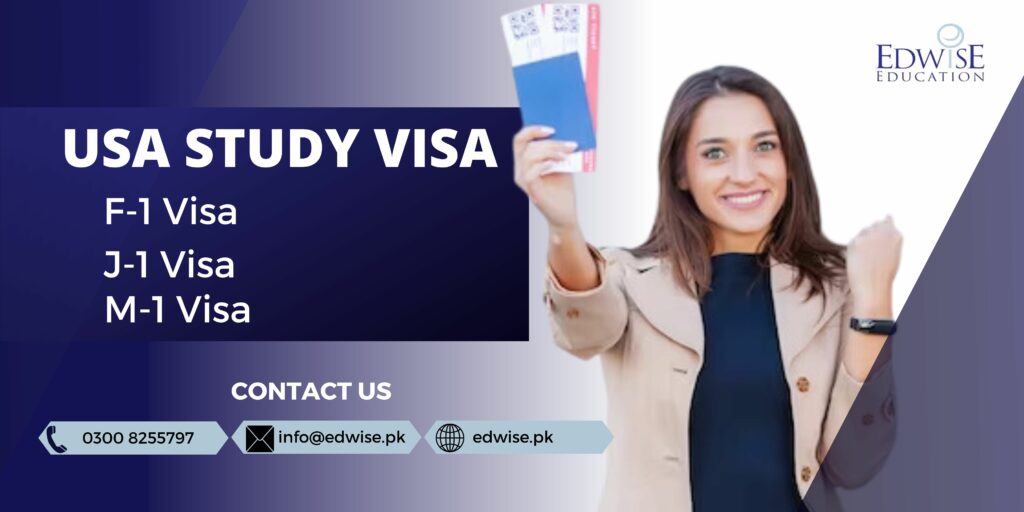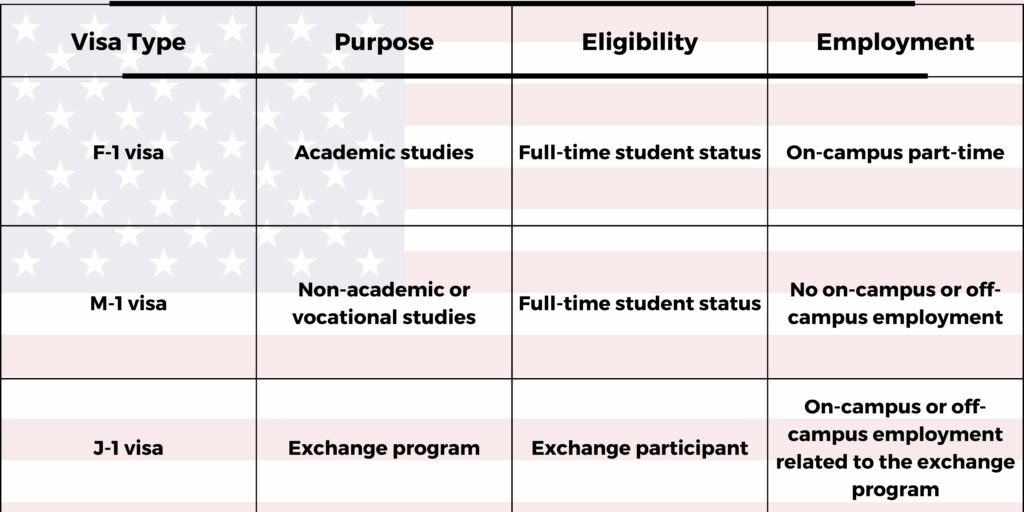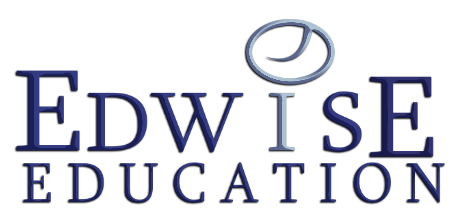USA Study Visa From Pakistan
Are you a student in Pakistan aspiring to pursue higher education in the United States? If so, obtaining a study visa is an essential step in fulfilling your educational dreams. The process of applying for a USA study visa from Pakistan can seem complex and overwhelming, but with the right guidance and preparation, you can navigate through it successfully. In this article, we will provide you with a comprehensive guide on how to obtain a USA study visa from Pakistan.

Types of USA study visas
There are three types of USA Study Visa From Pakistan. Here’s a brief introduction to each visa type, and we will discuss each of them in more detail below:
- F-1 Visa: The F-1 visa is the most common USA study visa for Pakistani Students who want to pursue academic studies at a U.S. university or college. It allows students to work on campus and potentially engage in Optional Practical Training (OPT) after completing their studies.
- J-1 Visa: The J-1 visa is issued to exchange visitors participating in educational and cultural exchange programs. It covers research scholars, professors, and students involved in academic exchange programs sponsored by educational or cultural institutions.
- M-1 Visa: The M-1 visa is for individuals pursuing non-academic or vocational studies in the United States. It is granted to students enrolling in technical schools, vocational programs, or non-degree courses. M-1 visa holders are not allowed to work off-campus during their studies.

Now Lets Dive in each Study Visa Types:
F-1 Visa:
The F-1 visa is a study visa that allows Pakistani students to pursue their education in the United States. It is designed for individuals who want to study full-time at accredited American colleges or universities. The following are the eligibility requirements and application process for the F-1 visa:
Eligibility Requirements for the F-1 Visa:
- Citizenship and Visa Requirement: To be eligible for an F-1 visa, you must come from a country that requires a visa to enter the United States. If your country is part of the visa waiver program, you won’t need an F-1 visa.
- Enrollment in a Full-Time Academic Program: You must be enrolled in a full-time academic program at a recognized U.S. college or university. This means that you need to have already applied and been accepted to a school before applying for the F-1 visa.
- Sufficient Funds for Financial Support: You must have enough funds to support yourself during your studies in the United States. This includes tuition fees, living expenses, and other education-related costs. The U.S. government wants to ensure that you can financially sustain yourself without relying on unauthorized employment.
- Clean Criminal Record: Having a clean criminal record is necessary for obtaining an F-1 visa. The U.S. government wants to ensure the safety and security of its citizens and residents, so any previous criminal activities may impact your visa application.
Application Process for the F-1 Visa:
- Apply to a U.S. College or University: The first step is to apply to a U.S. college or university and receive an acceptance letter. Once accepted, the school will provide you with a Form I-20, which certifies your eligibility for an F-1 visa.
- Submit Visa Application: You need to submit your visa application to the U.S. embassy or consulate in your home country. This involves completing the necessary forms, paying the application fee, and providing any required supporting documents.
- Attend the Interview: After submitting your application, you’ll be scheduled for an interview at the U.S. embassy or consulate. The consular officer will assess your intentions and eligibility for the F-1 visa. Be prepared to answer questions about your educational background, plans, and financial situation.
Processing Time and Visa Issuance:
The processing time for an F-1 visa can vary, but it usually takes around 1-2 months. It’s important to apply well in advance to account for any potential delays. Once your visa is approved, you’ll receive a visa sticker that will be placed on your passport. This sticker serves as your official authorization to study in the United States as an F-1 student.
J-1 Visa:
The J-1 visa is a non-immigrant visa designed for foreign nationals who want to participate in work and study-based exchange visitor programs in the United States. The J-1 study visa allows international students to engage in student exchange programs. Here’s what you need to know about the J-1 visa:
Eligibility Requirements for the J-1 Study Visa:
- Citizenship and Visa Requirement: To be eligible for a J-1 study visa, you must come from a country that requires a visa to enter the United States. If your country is part of the visa waiver program, you may not need a J-1 study visa.
- Acceptance to a J-1 Student Exchange Program: You must be accepted into a J-1 study exchange program offered by a recognized sponsor. This involves applying to a program that aligns with your academic goals and aspirations.
- Sufficient Funds for Support: Having enough financial resources to support yourself during your participation in the J-1 study program is crucial. This includes covering tuition fees, living expenses, healthcare, and other associated costs.
- Clean Criminal Record: A clean criminal record is required for obtaining a J-1 study visa. Adhering to legal requirements ensures the safety and security of the exchange student community in the United States.
Application Process for the J-1 Study Visa:
- Acceptance to a J-1 Student Exchange Program: Firstly, you need to be accepted into a J-1 student exchange program of your choice. Research and identify programs that align with your academic interests, and complete the application process to secure your acceptance.
- Obtain Form DS-2019: Upon acceptance, your program sponsor will provide you with Form DS-2019, which certifies your eligibility for a J-1 study visa from Pakistan. This form is a crucial document for your visa application.
- Submit Visa Application: Next, submit your visa application to the U.S. embassy or consulate in your home country. Ensure that you accurately complete the required forms, pay the application fee, and provide all the necessary supporting documents.
- Attend the Interview: You will be scheduled for an interview at the U.S. embassy or consulate. Be prepared to discuss your chosen J-1 student program, your educational goals, and demonstrate your eligibility for the visa. The interview allows consular officers to assess your suitability for the program.
Processing Time and Visa Issuance:
The processing time for a J-1 student visa varies, but it typically takes around 1-2 months. It’s advisable to submit your application well in advance to account for any potential delays. Once your visa is approved, you will receive a visa sticker that needs to be affixed to your passport. This sticker serves as official authorization for your participation in the J-1 student program in the United States.
Benefits of Participating in a J-1 Student Exchange Program:
- Study at a U.S. College or University: The J-1 student exchange program provides an opportunity to pursue education at renowned U.S. colleges or universities, expanding your academic horizons.
- Cultural and Societal Learning: Immerse yourself in U.S. culture and society, fostering a deeper understanding and appreciation of different perspectives.
- Networking Opportunities: Connect with fellow international students, creating a global network that can benefit your future personal and professional endeavors.
- Practical Field Experience: Gain practical experience in your field of study through internships, research programs, or teaching opportunities, enhancing your skillset and employability.
Students Reviews
Hirayy Shaikh
Amazing people with exceptional skills They don’t only help students for applying visa but also arrange IELTS classes. Thank you so much guys for all your efforts.
Munawar Hussain
I did use them services on 2010. ABSOLUTELY amazing and highly recommended. Its hard to find Honest people like them.
Maheen Kalani
Edwise, one of the brilliant consultancy. It’s been one year in Canada at Simon Fraser University and they were my stepping stone who guided me in everything.`
3. M-1 Visa:
The M-1 USA Study visa is a non-immigrant visa designed for foreign students who wish to pursue full-time vocational or non-academic programs at institutions in the United States. While less common than the F-1 visa, which is for academic programs, the M-1 visa offers an excellent opportunity to gain specialized vocational training. If you’re considering an M-1 visa, here’s what you need to know.
Eligibility Requirements for the M-1 Visa
1. Citizenship and Visa Requirement:To be eligible for an M-1 visa, you must be a citizen of a country that requires a visa to enter the United States. If your country falls under the visa waiver program, you may not need an M-1 visa. However, if your country necessitates a visa, the M-1 visa is the appropriate choice.
2. Enrollment in Full-Time Vocational Program:You must be enrolled in a full-time vocational or non-academic program at a recognized U.S. institution. This entails applying to a program that aligns with your vocational interests and goals.
3. Sufficient Funds for Support:Having adequate financial resources to support yourself during your study in the United States is essential. This includes covering tuition fees, living expenses, health insurance, and other related costs.
4. Clean Criminal Record:A clean criminal record is a requirement for obtaining an M-1 visa. Adhering to legal requirements ensures the safety and security of the educational environment in the United States.
The Application Process for the M-1 Visa
1. Apply to a Vocational or Non-Academic Institution:Firstly, apply to a vocational or non-academic institution in the United States and secure admission. Research and select programs that align with your vocational aspirations.
2. Obtain Form I-20:Once accepted, your school will provide you with Form I-20, which certifies your eligibility for an M-1 visa. This document is crucial for your visa application.
3. Submit Visa Application:Next, submit your visa application to the U.S. embassy or consulate in your home country. Ensure that you accurately complete the required forms, pay the application fee, and provide all necessary supporting documents.
4. Attend the Interview:You will be scheduled for an interview at the U.S. embassy or consulate. Be prepared to discuss your chosen vocational program, and your intentions, and demonstrate your eligibility for the visa. The interview enables consular officers to assess your suitability for the program.
Processing Time and Visa Issuance
The processing time for an M-1 visa can vary, typically taking around 1-2 months. It’s advisable to begin the application process well in advance, especially during peak seasons. Once your visa is approved, a visa sticker will be affixed to your passport, serving as official authorization for your full-time vocational studies in the United States.
Benefits of Studying on an M-1 Visa
1. Study at Vocational or Non-Academic Institutions:The M-1 visa offers the opportunity to pursue full-time vocational studies at respected institutions in the United States, acquiring specialized skills and knowledge.
2. Cultural and Societal Learning:Immerse yourself in U.S. culture and society, gaining a deeper understanding and appreciation of different perspectives.
3. Networking Opportunities:Connect with fellow international students, building valuable global networks that can benefit your future personal and professional endeavors.
4. Practical Experience in Your Field:Gain hands-on experience in your chosen vocational field, honing your skills and enhancing your career prospects.
Conclusion:
Securing a USA study visa from Pakistan is a significant and crucial undertaking that plays a pivotal role in realizing your educational aspirations. To ensure a smooth and successful process, it is imperative to have a comprehensive understanding of the eligibility requirements, application procedures, and the advantages associated with each visa category. By gaining this knowledge, you can make informed decisions and adequately equip yourself for the journey ahead. It is highly recommended to meticulously plan ahead, meticulously gather all the necessary documentation, and seek guidance and support from the relevant authorities to maximize the probability of a prosperous visa application. With heartfelt wishes, we extend our best regards and hope that your educational expedition in the United States brings you immense growth and fulfillment.

